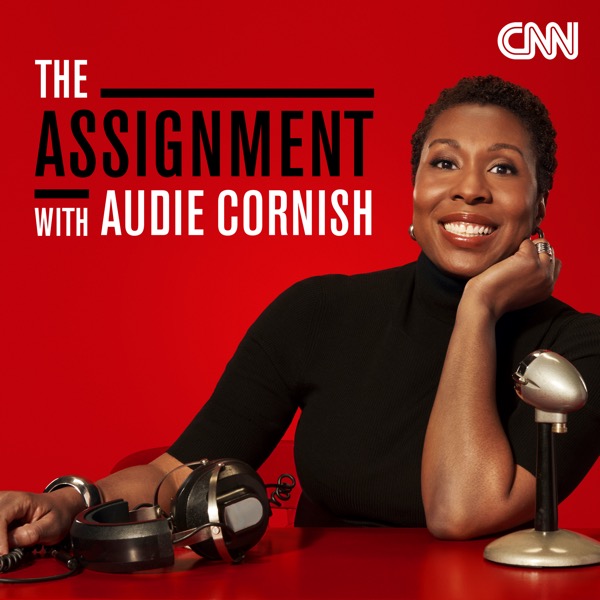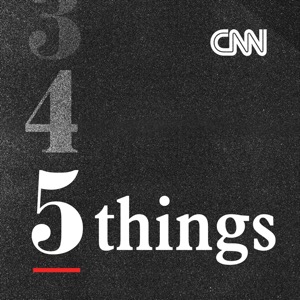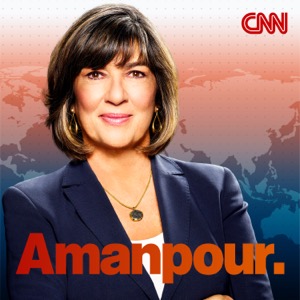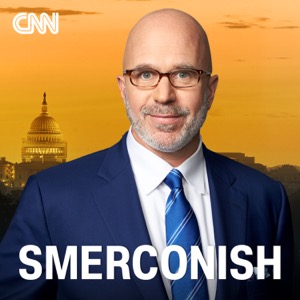podcast
The Assignment with Audie Cornish
Every Monday on The Assignment, host Audie Cornish explores the animating forces of American politics. It’s not about the horserace, it’s about the larger cultural ideas driving the American electorate. Audie draws on the deep well of CNN reporters, editors, and contributors to examine topics like the nuances of building electoral coalitions, and the role the media plays in modern elections. Every Thursday, Audie pulls listeners out of their digital echo chambers to hear from the people whose lives intersect with the news cycle, as well as deep conversations with people driving the headlines. From astrology’s modern renaissance to the free speech wars on campus, no topic is off the table.

The Economy’s Bad Vibes
The Assignment with Audie Cornish
May 30, 2024
We’re seeing conflicting messages about the state of the economy, especially from political leaders. And we’re getting truly mixed message about what – if anything – can be done, at least in the short term. A listener from L.A. understands this first-hand, and calls in with an assignment. Audie brings in Dr. Gary Hoover, Executive Director of The Murphy Institute and Professor of Economics at Tulane University, to talk about the economy’s bad vibes, and what hope – if any – lies ahead. Audie also dives into the mailbag and gets an unusual email from a special listener.
Call or text us at (202) 854-8802
Episode Transcript
Listener Voicemail
00:00:00
Hi Audie.
Listener Voicemail
00:00:01
Hi Audie.
Listener Voicemail
00:00:02
Hi Audie.
Listener Voicemail
00:00:02
Hi Audie. I love that you have this line.
Audie Cornish
00:00:05
One of the best parts of doing this show is hearing from you directly.
Listener Voicemail
00:00:11
Hello, Trump voter here. But I'm a big fan of the podcast.
Listener Voicemail
00:00:16
Hi Audie and team. I'd like to give you an assignment.
Listener Voicemail
00:00:20
I like any other topic more than politics, but it is an election year. So keep doing what you're doing. Thanks a bunch. Bye bye.
Audie Cornish
00:00:32
Today's episode of The Assignment is all vibes, the bad ones around the economy.
Danni
00:00:37
With the elections coming up and like the economy still having like bad vibes. I kind of wanted to talk real quick about, you know, wages and having a job in this economy.
Audie Cornish
00:00:51
And the good ones from you, our listeners.
Miguel
00:00:54
I just started thank you to myself what my assignment would be. And it led me into writing a particular song called The Assignment.
Audie Cornish
00:01:07
We begin with an assignment we got from Danni in Los Angeles.
Danni
00:01:10
Hi Audie. I am in my first what I call adult job, like in corporate America. And, you know, I was very surprised and disappointed that I finally made it to what was considered, you know, the top. Like, you go to college, you have all these student loans and you get to that job, and I can't make a living. Like I'm working two jobs and I am barely getting by. I don't understand why this is the way it is. Like, why can't I just make a living wage at my job?
Audie Cornish
00:02:08
"I don't understand why this is the way it is. Why can't I just make a living wage at my job?" All right, so there's a lot to unpack in that question. So we called up a friend of the show, Dr. Gary Hoover. Gary goes by Hoov, and he's the executive director of The Murphy Institute and a professor of economics at Tulane University. Now, the last time we spoke, it was about why economists were struggling to understand the post pandemic economy. It turns out he's become a listener, just like you.
Gary Hoover
00:02:37
I still listen to, you know, quite regularly. I like all of the stuff
Audie Cornish
00:02:42
You do? What? No. I'm serious. You do? That's so cool.
Gary Hoover
00:02:47
You did one, Taylor Swift?
Audie Cornish
00:02:49
Oh, yeah.
Gary Hoover
00:02:50
To be honest with you, I'm not a – Taylor Swift is not my thing, but, you do good stuff.
Audie Cornish
00:02:56
So I asked Hoov to help me answer your question, Danni.
Gary Hoover
00:02:59
I hear a couple of things going on. You know, there's something that economists call the life cycle hypothesis to where these are not your prime earning years. That actually comes somewhere in their 40s. And as this person gains experience, things will get better. The the vibes thing is rather interesting in that now that they have a bit of income. They're wondering, why can't I buy all other things that others can buy with the with their income? Prices have risen. So there's this bad feeling that people have and and economists have talked about this. So there's two things that could happen. Prices could rise and then your income could rise to meet those prices, and you're at the same level, or your income could rise and then prices creep up to put you back at the same level.
Audie Cornish
00:04:02
We actually asked Danni a little bit more about their situation, just so we had a better grasp on it. Here's what they told us.
Danni
00:04:09
I definitely spend more than what I bring in with my one job, and it's it's not like fun spending. Like when I add up all my bills for the month: rent, you know, car insurance, car payment, I am left with nothing, basically.
Gary Hoover
00:04:29
So so what I hear them speaking to is that there is nothing what economists call discretionary spending, right? Everything that they are spending on right now is just necessities. That is going to leave a bitter taste in their mouth. And it feels to them – and this is where the bad vibes comes in – that they're working just to pay for their rent. What's what's the point of that? What's the point of working if all I'm doing is working to pay rent so that I can go back to work? And that will induce some bad vibes.
Audie Cornish
00:05:07
Danni also mentioned a major expense: student loans. Here's how they described it.
Danni
00:05:12
I'm a millennial, so, like, I went to school and they told me, you'll get a degree and you'll get a nice job. And it just seems like there has been so much sacrifice to kind of reach that the point where you do have that corporate job with benefits. And yet, it's still not enough.
Audie Cornish
00:05:32
Can you talk about this disillusionment? Because we hear it in other areas of the economy as well. Certainly home buying. Danni's talking about student loans. There's there are there are things that were kind of milestones and benchmarks. And when people can't reach them, you hear them talk the way Danni is.
Gary Hoover
00:05:51
Right? Well, as it relates to student loans, right, this is what I term a violation of a social contract. One of the things that we tout in our society is that going to school is a way to rise up the economic and social ladder. And that by going to school and you've heard this statistic a bunch of times, that someone who goes to college, in lifetime earnings, is going to end up making at least $1 million more than someone who only has a high school diploma. And so if we're going to tell people, "look, you're going to be better off financially if you go to college, you're going to have a better skill set." That it is a violation when people actually come out of college more broke than when they went in. Because before, before I went to college, I was just broke. And now, after having gone to college, I'm in debt. And I'm broke. And that's where people are becoming much, much more disillusioned.
Audie Cornish
00:07:00
So that brings us to Danni's final point about policies, relief, like what actually can be done. Here's how they kind of approach the question.
Danni
00:07:11
'My salary is $58,000 a year. That, after taxes in California, is less than $40,000. And on top of that, I was on Medi-Cal for a while, but I don't qualify for it anymore because I make too much money. So now I have to pay for insurance. And same with the student loans. And it's almost like, "Why hasn't the poverty line been raised to a point where it's actually at par with reality, where where people are? "
Gary Hoover
00:07:44
Well, the poverty line is actually a national statistic that's set as opposed to one that's set to the communities to where people live. So in the case of Danni here, we're talking about the national level being for a family of three, about $26,000 for a family of three. And it would be even lower for an individual who would be in a family of one. So that number is going to be even lower. And that's going to reflect geography. Whereas, had they lived in Jackson, Mississippi. That $40,000, they would have been able to have much more of their income available. But maybe for, you know, personal reasons, they don't want to live there. The, that geography and a national statistic matters a lot. And that's where I don't think it's going to be anything related to national policy that is going to be able to provide any relief for them. It's going to have to be state policy.
Audie Cornish
00:08:59
After the break, who've leaves us with a positive outlook for Danni. Also, we'll hear about an unusual email from a special listener. We'll be right back. Welcome back to The Assignment. I'm Audie Cornish. Danni's question jumped out at me because we're seeing conflicting messages about the state of the economy, especially from political leaders and truly mixed messages about what, if anything, can be done, at least in the short term.
Gary Hoover
00:09:30
There are absolutely things that can be done. And what I find rather interesting and conflicting about what you just brought up is that in my interactions with corporate executives and business professionals, the two things that they're going to say that they want to see in a workforce is a workforce that's trainable, meaning educated, and workforce that is present. And in other words, a workforce that's healthy. Yet the two things that they fight the hardest against is properly funding education policy and properly funding health policy, let alone the other areas that you spoke to. The problem is I want all of those things from a workforce, but I don't want to pay for them. I don't want to be the one that's responsible to help provide for the very things that I would expect these communities to have.
Audie Cornish
00:10:28
And we have people who say, you can't forgive all these student loans because they shouldn't have taken out these loans in the first place, and that's just giving away money, etc., etc.. There's this like push and pull about how and when to spend money in an effective way. It's not clear that pumping more money into the economy, one way or another, would be helpful in a situation where inflation, you know, while it's down from it's like 9% high in June 2022, it's still not great. So how how should we think about policy when any politician is talking to us about it?
Gary Hoover
00:11:03
We've got to be concerned about the amount of pain we're causing.
Audie Cornish
00:11:08
To try and have a quote unquote soft landing, right. Like the Federal Reserve is trying to moderate interest rate hikes in such a way that it won't actually drive up unemployment.
Gary Hoover
00:11:19
And that's where in policy debates these days, that's where the discussions lie. The discussion line is can we actually pull this off? And more times than not, in the past the soft landing has been an illusion and we never actually hit it. So, that's the tightrope that politicians are walking where they're going to say, look, I want to try and do these things to make life easier for you such as bringing down price levels. But I want to do it in a way. That doesn't cause immediate pain. Because immediately, going back to Danni, immediately, I got an election coming up. And so the last thing I want to do is go into an election with a recession. So I'm going to try and ease it down. But I'm also trying to not bring about a recession. So if I don't bring it down, the people keep feeling these bad vibes. If I do bring it down, then there's going to be other types of bad vibes. Which one am I going to live with in the short term? I think that's the political balance that all politicians are going to fight.
Audie Cornish
00:12:32
So what could get better for Danni? What could get worse? What are your parting words for them?
Gary Hoover
00:12:38
Things are absolutely going to be better for them as as they, acquire more skills, things are absolutely looking up. And this this person is college educated, too? Things are going to absolutely, without a doubt, get better. In the immediacy, in the next six months or so, maybe things will be closer to the same. But in the long term, I still would argue that they did the right thing, made the right choice, and are contributing in a very real way to what is going to make them better because they are part of the taxpaying populace that is going to make the economy work and is making it work. Things are a little bit rough right now, and there's no denying that, that things are a little bit rough. And having just enough to make ends meet seems rather discouraging. But the funny thing about it is, I could have said the same thing when I entered the job market back in 1986.
Audie Cornish
00:13:51
And that economy wasn't great either. I don't think, now that I look back on it.
Gary Hoover
00:13:56
Right, so I think I think everybody entering the economy from 1906 to 1986, the 2026, to an economy we aren't even in entering into that job market is always tough, but things will improve. I have nothing but greater expectations for where things are going to end up. I don't think they're going to be that bad in the long run.
Audie Cornish
00:14:24
That's Gary Hoover, Assignment listener, friend of the show and executive director of The Murphy Institute and professor of economics at Tulane University. Okay, one funny thing about working in the news is that you rarely have time to listen to or read the work of your colleagues. But the other day, I got a surprising email from a CNN address.
Miguel Asua
00:14:50
I am Miguel Asua. Otherwise known as Asua. And some folks call me Shining. I'm an artist. I'm a professional filmmaker. I'm a writer. And I also work at CNN as part of the tech ops group. We're the ones broadcasting the show from studio.
Audie Cornish
00:15:08
Now, usually I see Asua when I'm appearing on political panels, and he's a quiet, busy presence around the studio, with his earpiece buzzing with instructions from the control room. I didn't know this side of him: the songwriter and musician.
Asua
00:15:25
Nowadays I get up early, grab my coffee and go. I've been thinkin' 'bout the world, politicking with folks. Every day is something new. People struggling to cope and I'm just document life trying to offer some hope.
Miguel Asua
00:15:38
I had a long day at work, you know. It was just one of them days just back to back breaking news and a lot of emotions, that I had, you know, sort of pent in about how I felt about things and typically what I do on those days. I just come to the studio. I'll start on a beat. Whatever my fingers land on, I'll start playing and I'll start writing. And sometimes I need a little bit of noise. And so that particular night, I had The Assignment playing in the background, and there was an episode with, I believe his name is Rex. It was around his issues on gambling and what he was dealing with in his life. But as I was in the studio, just, you know, messing around with sounds, trying to figure out where I wanted to go sonically, I was inspired by his story. I just started thinking to myself what my assignment would be. You know, what my assignment is? And, you know, kind of centered around that issue or idea of purpose. And it led me into writing.
Asua
00:16:34
And I'm okay with the odds when it's equally yoked. Play tug of war, pulling different into the rope. Heavy conversations. I don't run from the smoke, healthy dialogue. That's the kind of vibe I promote.
Miguel Asua
00:16:46
So I love that particular line right there, because I'm trying to convey that, you know, I may not agree with something you say we might be at two different ends of a conversation of a theory of our beliefs, but I don't have to hate you. You know what I mean? I can disagree with you and still like you. We live in a society now where it's like, if you don't agree with me, if you don't follow me on social media, we're not friends. We got to be haters. And no, it shouldn't always be like that. You know, we can have differences and be cordial with one another. We can be respectful.
Miguel Asua
00:17:19
When you hear me on the mic, introducing the show. Think of history, knowledge that can help you to grow and we can have a dialogue while we grooving and vibing. This is prime time baby. Better know The Assignment. Aye. This is prime time, baby. Got to know The Assignment. Aye.
Audie Cornish
00:17:39
'Miguel Asua, CNN technical operator, filmmaker and writer and listener. You can find more of his work on Spotify and online. Just search by his name. It's spelt A-S-U-A. And here's where I get to say thank you for calling in with your ideas.
Listener Voicemail
00:18:04
I'm calling about the U.S. Postal Service and the dismal, service that we getting recently. I could care less about all of the ads and circulars, etc. that end up in my mailbox, but what I'm concerned about is mail in voting for people who cannot get to the polling stations. They need the mail in voting, and it needs to be able to be secure and prompt.
Audie Cornish
00:18:32
And criticism.
Listener Voicemail
00:18:34
I like any other topic more than politics.
Audie Cornish
00:18:38
And kind words.
Listener Voicemail
00:18:39
So I like your Gen Z coverage, even though I'm not a Gen Z. The recent one you did on parenting, Roy Wood Jr., loved Kara Swisher. I'm reading her book. Also watching The Girls on the Bus series on HBO. So thanks to you and your staff for doing such a great job.
Listener Voicemail
00:19:00
This is Otto Brown calling. And just listened to the recent episode about election workers. And really just struck a chord with me. I served as an election worker for three elections in Saint Louis County while I was in college. And really thought it was really one of the coolest experiences I've ever had. We work in bipartisan teams. I got to work with folks who disagreed on and would go in and vote for the other person on the on the ticket. But, you know, we have this fundamental belief that elections were important, but really just thought it was a really important episode. I think everyone should have to listen to that, to really hear what it takes to make these elections happen and make our country work. Thanks a lot for your time and love the show.
Audie Cornish
00:19:50
Thank you, Otto, for that last one. If you missed the episode autos talking about, you can check it out in our feed. It's called Counting Votes, Facing Threats: What It's Like To Run An Election.
Asua
00:20:04
Shift in the Climate, understand my assignment.
Audie Cornish
00:20:04
'That's it for this episode. We'll be back on Monday with another assignment. And seriously, we take your feedback and questions to heart. I listen to the messages and read the texts. Keep them coming. You can reach out to our team at (202) 854-8802. The Assignment is a production of CNN Audio. This episode was produced by Carla Javier. Matt Martinez is the senior producer of our show. Dan Dzula is our technical director. And the executive producer of our show is Steve Lickteig. We got support from Haley Thomas, Alex Manasseri, Robert Mathers, Jon Dianora, Leni Steinhardt, Jamus Andrest, Nichole Pessaru, and Lisa Namerow. Special thanks, as always to Katie Himan. I'm Audie Cornish.
Asua
00:20:54
I feel a shift in the climate, in the climate. I understand my assignment, my assignment. This is life realigning, realigning. I understand my assignment. Yeah. I think this is becoming my favorite. I think this is my favorite.



